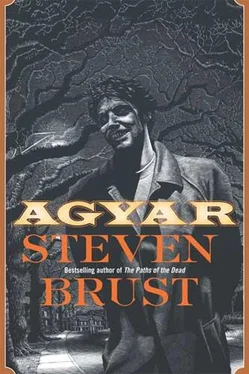Steven Brust - Agyar
Здесь есть возможность читать онлайн «Steven Brust - Agyar» весь текст электронной книги совершенно бесплатно (целиком полную версию без сокращений). В некоторых случаях можно слушать аудио, скачать через торрент в формате fb2 и присутствует краткое содержание. Жанр: sf_fantasy_city, на английском языке. Описание произведения, (предисловие) а так же отзывы посетителей доступны на портале библиотеки ЛибКат.
- Название:Agyar
- Автор:
- Жанр:
- Год:неизвестен
- ISBN:нет данных
- Рейтинг книги:3 / 5. Голосов: 1
-
Избранное:Добавить в избранное
- Отзывы:
-
Ваша оценка:
- 60
- 1
- 2
- 3
- 4
- 5
Agyar: краткое содержание, описание и аннотация
Предлагаем к чтению аннотацию, описание, краткое содержание или предисловие (зависит от того, что написал сам автор книги «Agyar»). Если вы не нашли необходимую информацию о книге — напишите в комментариях, мы постараемся отыскать её.
Agyar — читать онлайн бесплатно полную книгу (весь текст) целиком
Ниже представлен текст книги, разбитый по страницам. Система сохранения места последней прочитанной страницы, позволяет с удобством читать онлайн бесплатно книгу «Agyar», без необходимости каждый раз заново искать на чём Вы остановились. Поставьте закладку, и сможете в любой момент перейти на страницу, на которой закончили чтение.
Интервал:
Закладка:
We spoke of school, and her hopes for the future, and her love of dancing, and the exhilaration of being before an audience; a pleasure I’ve never felt, but can almost understand. She asked about me and I avoided answering. I asked about her and she told me some things. She talked about grabbing what she could from life; I talked about waiting while life delivered whatever I wanted.
“I don’t have the patience for that,” she said.
“You want it now.”
“Instant gratification,” she agreed. “I hate waiting.”
“I will remember that.”
“I told you about the bus.”
“That’s true; I’d forgotten. When that happens, it’s time to get a car.”
“I hate cars,” she said.
“If truth be known, so do I. But I hate buses, too.”
“What do you like?” she said.
“Walking.”
“How do you feel about flying.”
“Flying is okay; depends on how one does it.”
“Ships?”
“Only when necessary,” I said.
She shook her head. “I like to travel.”
“I like to be other places; I don’t like getting there.”
“We can work it out,” she said.
“I would imagine we can.”
Then she said, “So, would you like to show me your house?”
“Now?”
“Why not? Is it cold?”
“Not horribly.”
“Well then?”
“All right; let’s go.”
She put on a dark blue skirt and a Twain sweatshirt, brushed her hair, stuck a blue band in it, kissed me, and pronounced herself ready.
As I type this, the problem with bringing her to my home is staring at me so hard that I can’t believe I didn’t notice it at the time; I guess my head was so filled with Susan that there was no room for anything else. We walked through the Tunnel, arm in arm, talking about alternate energy sources, oil wars, and yellow journalism, and as we turned onto Twenty-eighth it suddenly hit me, and I stopped dead; I believe I felt perspiration on my forehead in spite of the cold, but my imagination may have supplied that later.
“What is it?” she said.
I stood there, unable to answer. It is one thing to know that I can circumvent the police, quite another to expect Susan to do so; particularly when she didn’t even know they were there.
So, what to do?
I stood there for what seemed like forever, trying to think of a way out of this, while Susan said, “Jonathan? What is it? Are you all right?” I could change my mind about showing her the house. I played that conversation over in my mind and decided against it. I could tell her we had to sneak in, and then explain that… no.
I shook my head and said, “It’s nothing, love. A thought just came to me, but it doesn’t matter.”
When there are no easy ways, you take the hard way, right? Right.
I pulled up the hood of my parka and approached the rust brown ’89 Plymouth from behind, and after telling Susan I had to ask these gentlemen something, I put my head next to the passenger door and rapped on the glass. Two men were in it, both seemed to be in their early thirties. Maybe taxi drivers turn into policemen in their middle years. They looked at me. One was dark and had a fleshy face with a high nose, the other had short, light-colored hair, blue eyes, a fair complexion, and a pointed chin.
He rolled down the window, started to ask what I wanted, then turned his head quickly to glance at the sketch on the clipboard on the seat between them.
That was as far as he got before he fell asleep. His partner actually reached into his coat before slumping forward against the steering wheel, and my knees were shaking.
When I turned around, Susan was standing right behind me, staring at them. “What happened? Should we call an ambulance?”
I looked her in the eye. “Nothing happened.”
“But-”
“Nothing happened. We just walked by this car, not even stopping, and we never looked through the window. Nothing happened.”
“Nothing happened,” she repeated dully.
We took two steps toward the house and I said, “Snap out of it, Susan.”
“Huh, what?”
“You were daydreaming.”
“Oh. Hmmm. Maybe I’m short on sleep.”
“Could be. You can sleep at the house, if you want to.”
“How much farther is it?”
“We’re here.”
“This place?”
“Is something wrong?”
“No, it’s beautiful. When was it built?”
“I don’t know. Late nineteenth century, I think.”
She looked at it, studying as well as she could in the relative dark; the nearest streetlight is half a block away. She said, “I’d like to see it in the daylight. How far around does the porch go?”
“About halfway.”
“Is that window stained-hey, you haven’t shoveled the walk.”
“Sorry.”
“No, I mean, why aren’t there any tracks?”
“I usually leave by the back door, but I wanted you to see the front.”
“Oh. Why is there orange tape across the door?”
“Don’t ask. Go under it.”
I tried the knob and said, “That’s right. It’s locked. Wait here and I’ll let you in. Shan’t be a minute.”
“‘Crime Site’?” she read from the tape.
“Don’t ask,” I repeated.
“All right.”
I slipped inside, turned on the one working light in the living room, and let her in. She stepped into the entryway and said, “Jonathan, this is splendid.”
“Thanks. Rent-free, too.”
“It is?” She stared.
“Well, officially no one lives here.”
“You mean you-”
“Right.”
“Why?”
I shrugged. “Easier this way.”
“Who owns it?”
“A professor at Twain. Carpenter.”
“French Lit?”
“Right.”
“Does he know you’re living here?”
“I keep forgetting to look him up and tell him.”
She shook her head, puzzled, I guess, and looked at the woodwork that was there, the woodwork that had been removed, the stained glass, the floors, the high ceilings. She looked back at me to say something, then frowned. “Jonathan, are you all right?”
“Why do you ask?”
“I don’t know; you look ill.”
“I’m feeling a little shaky, but it’s all right.”
“Are you certain?”
I nodded. About then, Jim came down the stairs, noticed the light, and said, “Won’t the police notice if you leave that on in here?”
I shook my head.
Susan said, “That’s funny.”
“What?”
“I don’t know. I thought for a minute… Jonathan, is this place haunted?”
“Not unpleasantly so. I didn’t know you believed in ghosts.”
“I’m not sure that I do,” she said. “But…” Her voice trailed off into silence.
“Come on, let’s look at the rest of the house.”
“Yes, let’s.”
I showed her the rest of the house. She made several comments to the effect that it didn’t look lived in, and several more about the fixtures (she seemed especially delighted that the old gas lamps were still in place, even though there was no gas coming through the pipes), but most of her discussion was about how she would fix it up. She spoke of Victorian-style furnishings without the Victorian love of clutter; of the painting that would go above the fireplace, of William Morris wallpaper.
She was enchanted with the kitchen, and spoke of cooking some crepes. I smiled noncommittally and mumbled something. She said, “You don’t have a refrigerator.”
“No, but isn’t the stove clean?”
“You don’t cook much, do you?”
“I must admit I’ve never really learned how.”
“I’ll teach you,” she said. “But you’ll have to get a refrigerator.”
She tsked at the shape the basement was in, and spoke of finishing it, while I went over in my mind some of the practical considerations of the two of us traveling together. Funny I hadn’t thought of any of this before. What’s in the trunk, dear? Oh, nothing important. And, Where are you going, darling? Oh, I’ll be gone again until this evening. Looked at that way, the whole thing was absurd.
Читать дальшеИнтервал:
Закладка:
Похожие книги на «Agyar»
Представляем Вашему вниманию похожие книги на «Agyar» списком для выбора. Мы отобрали схожую по названию и смыслу литературу в надежде предоставить читателям больше вариантов отыскать новые, интересные, ещё непрочитанные произведения.
Обсуждение, отзывы о книге «Agyar» и просто собственные мнения читателей. Оставьте ваши комментарии, напишите, что Вы думаете о произведении, его смысле или главных героях. Укажите что конкретно понравилось, а что нет, и почему Вы так считаете.












